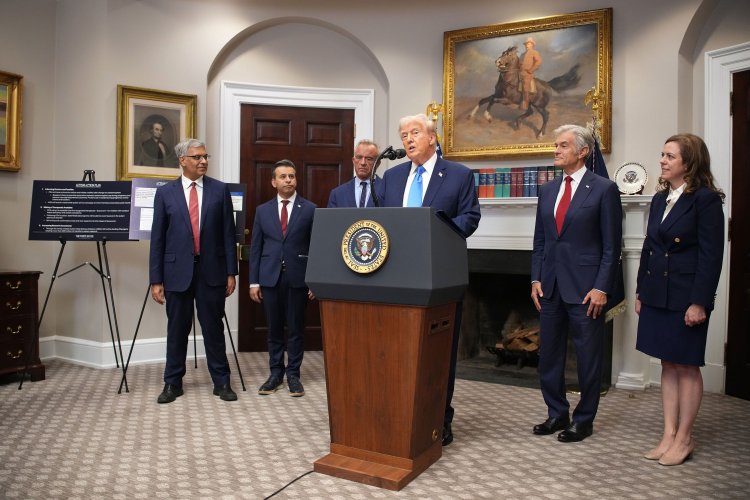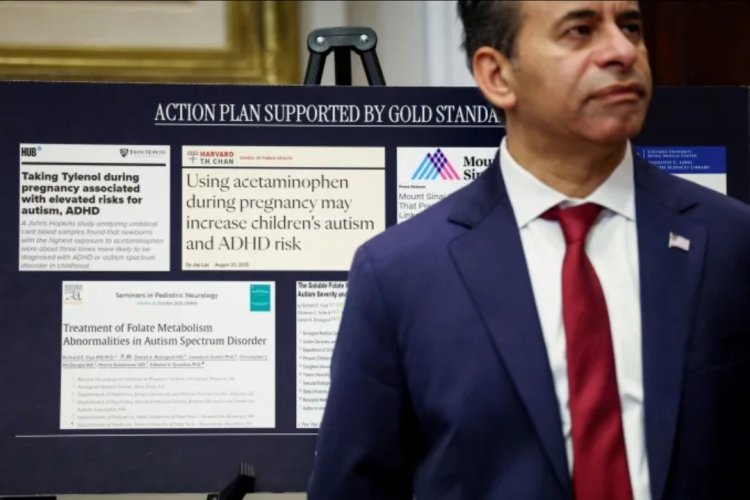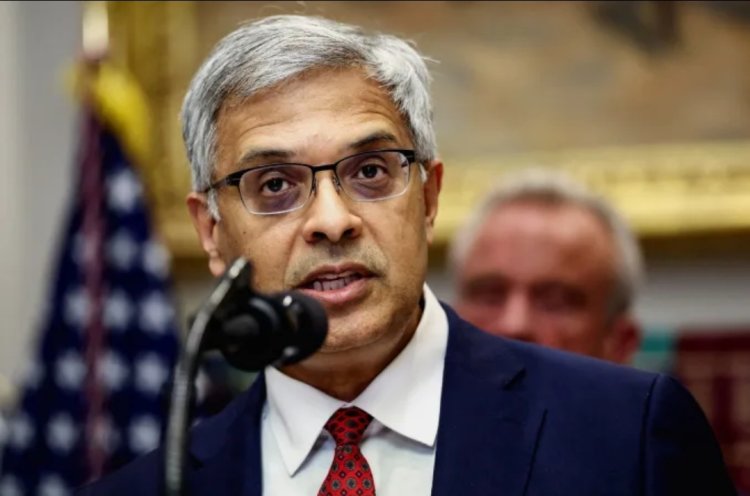Trump Links Autism to Acetaminophen Use in Pregnancy, But Studies Say It’s Safe?.
President Donald Trump declared that the US Food and Drug Administration will alert physicians that Tylenol usage during pregnancy may be linked to a "very increased risk of autism," even though there has been proof for decades that the is safe.

Trump stated, "They strongly advise women to limit their use of Tylenol during pregnancy unless medically necessary," such as to treat fever, "if you can't tough it out." There are other possible causes of autism, according to experts, and there is conflicting evidence linking Tylenol to autism.
Fever can be harmful to the foetus and the pregnant woman if left untreated, according to specialists. Miscarriage, birth abnormalities, and high blood pressure are among the risks. Research indicates that the majority of pregnant women take acetaminophen, which is marketed under the Tylenol brand.
The only safe over-the-counter treatment for pregnant women's pain or fever is paracetamol. Ibuprofen and regular-dose aspirin are two more popular painkillers that can raise the risk of major pregnancy problems.
US Treasury Chief: Oil Tariffs Will Collapse Russian Economy
Trump did not keep his comments about Tylenol during pregnancy to himself while speaking from the White House with US Health and Human Services Secretary Robert F. Kennedy Jr., US Food and Drug Administration Commissioner Dr. Marty Makary, US National Institutes of Health Director Dr. Jay Bhattacharya, and US Centres for Medicare & Medicaid Services Administrator Dr. Mehmet Oz.
He supported reducing the number of kid immunisations and even delaying the hepatitis B vaccination for babies until age 12, a public health measure that nearly eradicated the disease in youngsters. Without offering any proof, Trump claimed that "too much liquid, too many different things are going into that baby."
Numerous studies have demonstrated that vaccinations and autism are unrelated.
Trump expressed gratitude to Kennedy for joining him in elevating autism to the "forefront of American politics." Long-time anti-vaccine campaigner Kennedy has advanced debunked claims that vaccines cause autism. Trump claimed that "we understood a lot more than a lot of people who studied it."
Trump's tariff authority is under threat from legal challenges, and India will pay a 50% penalty.
Compared to Trump's repeated warnings not to give Tylenol to infants or consume it while pregnant, Kennedy and the FDA's statements on Monday were more modest. Kennedy announced that HHS will begin a national public education effort to educate families and safeguard the public's health regarding Tylenol use during pregnancy. According to him, the FDA is advising medical professionals to use their best judgement when prescribing paracetamol for pregnancy-related fevers and pains by using the lowest effective dosage for "their shortest necessary duration and only when treatment is required."
In a letter to doctors, the FDA stated that the decision to use Tylenol "still belongs with parents" and that it is starting the process of changing the safety label on acetaminophen products. "A causal relationship has not been established," the agency continued, despite the fact that studies have described a correlation. On Monday, Kenvue, the company that makes Tylenol, stated that it "strongly disagrees" that paracetamol causes autism and expressed "deep concern about the health risks and confusion this poses for expecting mothers and parents."
In a statement, the business claimed that as long as a pregnant woman needs pain relief during her pregnancy, Acetaminophen is the safest alternative. Without it, women are forced to choose between using riskier alternatives or suffering from illnesses like fever that could affect both mother and child. If untreated, high fevers and pain are well known to pose a risk to a pregnancy. The message that expecting moms should consult a healthcare provider before using any over-the-counter drugs will also be reinforced, according to Kenvue.
New Chief Minister of Delhi: Name of the new Chief Minister, first time Bahubali nominated on these
What the science says
The science surrounding Tylenol's link to autism is still up for debate. Acetaminophen use during pregnancy was not linked to autism, attention deficit hyperactivity disorder, or any other neurodevelopmental condition, according to a 2024 peer-reviewed Swedish study that looked at over 2 million children and was published in JAMA.

A BMC Environmental Health research published in August examined 46 papers on the relationship between neurodevelopmental problems and paracetamol use during pregnancy. The researchers explicitly studied the relationship between paracetamol usage and autism in six of the articles they reviewed.
All things considered, the analysis found "strong evidence of an association" between paracetamol use during pregnancy and autism; nevertheless, the authors were cautious to state that the study could only demonstrate an association and not prove that paracetamol caused autism.
In that analysis, the researchers said, "We recommend judicious paracetamol use — lowest effective dose, shortest duration — under medical guidance, tailored to individual risk–benefit assessments, rather than a broad limitation." The Autism Science Foundation described the announcement as "dangerous" and expressed "deep concern."
The group's president, Alison Singer, issued a statement saying, "We don't know why this announcement was made today or how the conclusions were reached. "No fresh information or research findings were shared or offered. There aren't any recent studies in the literature. At scientific or medical conferences, no new presentations on this subject were given.
Rather, President Trump discussed his thoughts and feelings without providing scientific proof. "Tough it out," he added, referring to not taking Tylenol or giving it to your child. It reminded me of the time when mothers were held responsible for autism. If your child has autism, it is your fault if you are unable to handle the discomfort or a fever. That was startling. It's just shocking.
The American College of Obstetricians and Gynaecologists' president, Dr. Steven J. Fleischman, criticised Monday's announcement as careless. Fleischman issued a statement saying, "Today's announcement by HHS is not supported by the full body of scientific evidence and dangerously simplifies the many and complex causes of neurologic challenges in children." "The willingness of our federal health agencies to make a decision that will impact the health and well-being of millions of people without the support of solid data is extremely concerning."
FDA approves drug to treat autism
"The first FDA-recognized treatment for autism," according to the FDA, is the prescription leucovorin, a high-dose calcium folinic acid that is commonly used to treat cancer patients during chemotherapy, for the treatment of autism in children. If approved, the drug will be covered by Medicaid programs.
To investigate the deaths of Ashraf and Atiq Ahmed, CM Yogi forms a three-person team.
The branded variant of leucovorin, a prescription high-dose calcium folinic acid manufactured by GSK, Wellcovorin, has also had its previously revoked approval restored, according to the FDA. When the manufacturer stopped selling the medication in 1999, the FDA revoked its approval.
To include information on cerebral folate insufficiency (CFD), a disorder where there is insufficient folate in the cerebrospinal fluid—the fluid that surrounds the brain and spinal cord—the FDA requested that GSK submit a new application. In addition to its usual use during chemotherapy for cancer patients, leucovorin has also been used off-label to treat CFD.
GSK stated that upon the agency's request, it will submit a label change for Wellcovorin. Low brain levels of folate, a B vitamin present in many foods such as leafy greens, almonds, and eggs, have been linked in some studies to autism; however, further clinical trials are required to confirm this theory. To create new red blood cells, the body need folate. It is necessary for the fetus's growth and development throughout pregnancy and can help avoid birth abnormalities.
Folic acid, a synthetic version of folate, is frequently added to foods like rice, bread, and pasta since the body cannot store a lot of natural folate. Another way to take it is as a dietary supplement.
All women who are able to conceive should already take 400 microgrammes of folic acid daily, according to the CDC. Only a small number of studies have tested leucovorin in autistic children, although some experts believe the results are encouraging.
In Phoenix, Arizona, paediatric neurologist Dr. Richard Frye, who co-founded the organisation Autism Discovery and Treatment Foundation, reported that around three-quarters of the 93 autistic children in his initial study who were examined for antibodies that could block folate from getting to the brain had them.
Regarding Asad's encounter with his son, Atiq Ahmed declares, "I am responsible."
He added that about one-third of kids who had positive antibody tests benefited at least somewhat from leucovorin. They became more proficient in their language. Their ability to communicate verbally got better.
The idea that these antibodies can contribute to autistic symptoms is intriguing, according to autism supporters, but the research is still in its early stages. Families of individuals with autism who are not affected by the disorder can also carry the antibodies.
"There's no autism pill," Frye said, although he has seen leucovorin help kids with autism. Additionally, there is no one-size-fits-all solution. One thing we do know about autism is that it's a complex condition that requires individualised care for each child. Makary called the new autism programs revolutionary. This government is collaborating to pose important queries regarding why children in our country are becoming ill far too frequently. We must make a difference, he continued, even though medicine is doing little studies and providing us with information we already knew.
Dr. Jay Bhattacharya, the director of the National Institutes of Health, also said on Monday that 13 research projects spanning biology, environment, and genetics will receive more than $50 million in grants.

Autism rates rise
Trump described the rise in autism cases over the years as one of "the most alarming developments in history" and referred to it as a "horrible, horrible crisis" on Monday. Kennedy stated that all agencies under his direction will be conducting study on the topic, and he stressed that scientists must work more quickly to identify the origins of autism.
New Chief Minister of Delhi: Name of the new Chief Minister, first time Bahubali nominated on these
In the United States, the number of individuals with autism has been rising. By the age of eight, the CDC estimates that 1 in 31 children had been diagnosed with autism spectrum disorder in 2022, up from 1 in 36 in 2020. In 2015, 1 in 68 kids have it. Increased awareness of symptoms and acceptance of the diagnosis, as well as a more expansive definition of autism adopted by the psychiatric profession in 2013, are factors contributing to the rise. A deliberate attempt has also been made to screen more young children for autism because early intervention can greatly enhance a child's symptoms and abilities over the long run.
Experts warn that blaming Tylenol and giving just one medication won't solve autism. In a statement, Dr. Susan Kressly, president of the American Academy of Paediatrics, stated, "We know that autism is complex, variable, and increasingly linked to genetics."
"Autis has no single underlying cause, and no single drug can provide all the necessary resources for autistic adults or children. Individualised plans can help enhance results that are significant to people and families. These plans typically combine behavioural, educational, developmental, and social-relational tactics. Additionally, we welcome and need more federal funding for research aimed at improving the lives of families with children with autism.
"At least 100 genes are involved in autism, just as there are multiple genes involved in different cancers," said paediatrician Dr. Peter Hotez, who co-directs the Centre for Vaccine Development at Texas Children's Hospital. It would be foolish, he continued, to claim that there is a single "smoking gun" that prevents or even causes autism.
Hotez, who has a daughter with autism and has written a book about the disorder, told CNN that "there's really a different form of autism for every different autism gene, and it's unlikely that a single unifying chemical agent is going to be able to address even a small proportion of those 100-plus autism genes." As a parent of a child with autism, let me explain: You want a straightforward response, don't you? However, it is evident that there isn't always a straightforward solution," he stated. "It is really difficult to pinpoint because there are so many factors to take into account."
'Unsupported and wrong'
The American Academy of Paediatrics, March of Dimes, EveryCure, and the American College of Obstetricians and Gynaecologists are among the professional organisations with expertise in autism that CNN contacted; none of them claimed to have been consulted by the Trump administration regarding the recent announcement.
This Was Not a Minor Fault": Expert Breaks Silence on Air India Flight 171 Crash
"The White House event on autism today was full of dangerous claims and misleading information that does a disservice to autistic people and sends a confusing message to parents and expecting parents," Kressly added. According to Dr. Veronica Gillispie-Bell, vice chair of the Clinical Practice Guidelines Committee on Obstetrics of the American College of Obstetricians and Gynaecologists, Trump's declaration will cause confusion and fear.
It puts us in a really tough situation, even for doctors. Tylenol is safe, according to our professional associations and the science, but when the FDA says otherwise, it puts us in a very tough spot, Gillispie-Bell told CNN.
Dr. Paul Offit, a paediatrician in the Division of Infectious Diseases at Children's Hospital of Philadelphia and a former member of the CDC's vaccination advisory panel, called President Trump's advice to women to "tough out" a fever "dangerously irresponsible."
"That only increases the risk for children, particularly when they have fever during the first trimester." The announcement was described as "the saddest display of a lack of evidence, rumours, recycling old myths, lousy advice, outright lies, and dangerous advice I have ever witnessed by anyone in authority in the world claiming to know anything about science," by Dr. Arthur Caplan of the NYU Grossman School of Medicine Division of Medical Ethics. In an email, he stated, "What was said was not only incorrect and unsupported, but it was outright malpractice in managing pregnancy and protecting foetal life."













